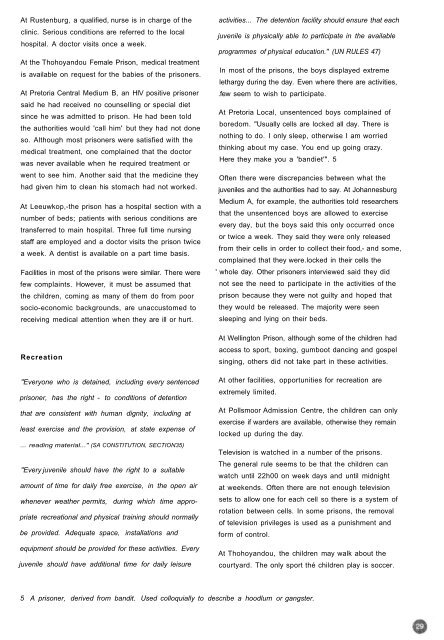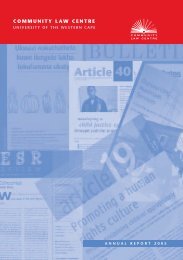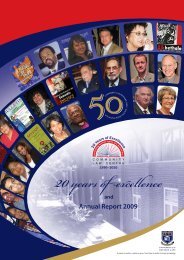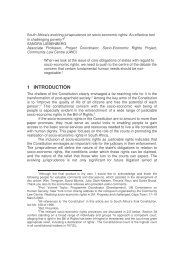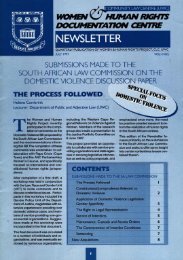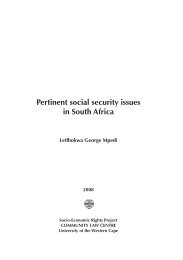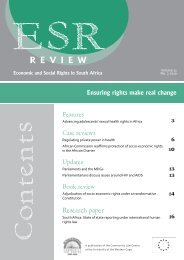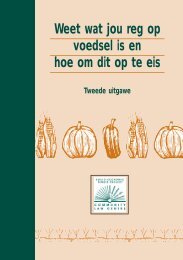Children in Prison in South Africa - Community Law Centre
Children in Prison in South Africa - Community Law Centre
Children in Prison in South Africa - Community Law Centre
You also want an ePaper? Increase the reach of your titles
YUMPU automatically turns print PDFs into web optimized ePapers that Google loves.
At Rustenburg, a qualified, nurse is <strong>in</strong> charge of thecl<strong>in</strong>ic. Serious conditions are referred to the localhospital. A doctor visits once a week.At the Thohoyandou Female <strong>Prison</strong>, medical treatmentis available on request for the babies of the prisoners.At Pretoria Central Medium B, an HIV positive prisonersaid he had received no counsell<strong>in</strong>g or special diets<strong>in</strong>ce he was admitted to prison. He had been toldthe authorities would 'call him' but they had not doneso. Although most prisoners were satisfied with themedical treatment, one compla<strong>in</strong>ed that the doctorwas never available when he required treatment orwent to see him. Another said that the medic<strong>in</strong>e theyhad given him to clean his stomach had not worked.At Leeuwkop,-the prison has a hospital section with anumber of beds; patients with serious conditions aretransferred to ma<strong>in</strong> hospital. Three full time nurs<strong>in</strong>gstaff are employed and a doctor visits the prison twicea week. A dentist is available on a part time basis.Facilities <strong>in</strong> most of the prisons were similar. There werefew compla<strong>in</strong>ts. However, it must be assumed thatthe children, com<strong>in</strong>g as many of them do from poorsocio-economic backgrounds, are unaccustomed toreceiv<strong>in</strong>g medical attention when they are ill or hurt.Recreation"Everyone who is deta<strong>in</strong>ed, <strong>in</strong>clud<strong>in</strong>g every sentencedprisoner, has the right - to conditions of detentionthat are consistent with human dignity, <strong>in</strong>clud<strong>in</strong>g atleast exercise and the provision, at state expense of... read<strong>in</strong>g material..." (SA CONSTITUTION, SECTION35)"Every juvenile should have the right to a suitableamount of time for daily free exercise, <strong>in</strong> the open airwhenever weather permits, dur<strong>in</strong>g which time appropriaterecreational and physical tra<strong>in</strong><strong>in</strong>g should normallybe provided. Adequate space, <strong>in</strong>stallations andequipment should be provided for these activities. Everyjuvenile should have additional time for daily leisureactivities... The detention facility should ensure that eachjuvenile is physically able to participate <strong>in</strong> the availableprogrammes of physical education." (UN RULES 47)In most of the prisons, the boys displayed extremelethargy dur<strong>in</strong>g the day. Even where there are activities,.few seem to wish to participate.At Pretoria Local, unsentenced boys compla<strong>in</strong>ed ofboredom. "Usually cells are locked all day. There isnoth<strong>in</strong>g to do. I only sleep, otherwise I am worriedth<strong>in</strong>k<strong>in</strong>g about my case. You end up go<strong>in</strong>g crazy.Here they make you a 'bandiet'". 5Often there were discrepancies between what thejuveniles and the authorities had to say. At JohannesburgMedium A, for example, the authorities told researchersthat the unsentenced boys are allowed to exerciseevery day, but the boys said this only occurred onceor twice a week. They said they were only releasedfrom their cells <strong>in</strong> order to collect their food,- and some,compla<strong>in</strong>ed that they were.locked <strong>in</strong> their cells the' whole day. Other prisoners <strong>in</strong>terviewed said they didnot see the need to participate <strong>in</strong> the activities of theprison because they were not guilty and hoped thatthey would be released. The majority were seensleep<strong>in</strong>g and ly<strong>in</strong>g on their beds.At Well<strong>in</strong>gton <strong>Prison</strong>, although some of the children hadaccess to sport, box<strong>in</strong>g, gumboot danc<strong>in</strong>g and gospels<strong>in</strong>g<strong>in</strong>g, others did not take part <strong>in</strong> these activities.At other facilities, opportunities for recreation areextremely limited.At Pollsmoor Admission <strong>Centre</strong>, the children can onlyexercise if warders are available, otherwise they rema<strong>in</strong>locked up dur<strong>in</strong>g the day.Television is watched <strong>in</strong> a number of the prisons.The general rule seems to be that the children canwatch until 22h00 on week days and until midnightat weekends. Often there are not enough televisionsets to allow one for each cell so there is a system ofrotation between cells. In some prisons, the removalof television privileges is used as a punishment andform of control.At Thohoyandou, the children may walk about thecourtyard. The only sport thé children play is soccer.5 A prisoner, derived from bandit. Used colloquially to describe a hoodlum or gangster.


